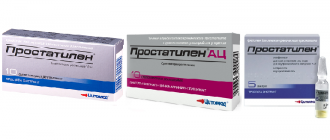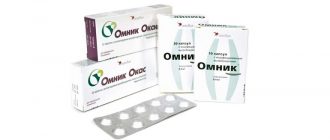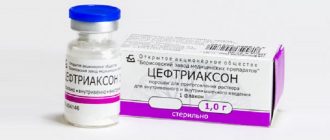The drug is a combined antibacterial agent. Biseptol for prostatitis is effective thanks to the two antibiotics included in the composition.
This is a prescription drug that has a number of contraindications and special instructions for use. Therefore, it should be taken only after consulting a doctor.
Release form and composition
The drug is produced in the form:
- tablets;
- suspensions (intended for children);
- concentrate for preparing a solution for infusion (used in medical institutions).
The active ingredients are two components:
- Sulfamethoxazole is a synthetic antibiotic from the group of sulfonamide drugs.
- Trimethoprim is a synthetic antibiotic derived from diaminopyrimidine.
The tablets are available in two dosages. The ratio of active components is 100/20 and 400/80 mg.
Auxiliary components: starch, talc, magnesium stearate, polyvinyl alcohol.
The tablets have a round flat shape, white with a yellow tint.
Available in blisters of 10 and 14 pieces. Supplied in a cardboard box of 2 blisters with instructions for use.
pharmachologic effect
Biseptol helps against prostatitis due to its complex composition.
Sulfamethoxazole, which is part of the drug, inhibits the production of dihydrofolic acid, which is necessary for the growth of bacteria. As a result, the growth and division of pathogenic microorganisms ceases and their death occurs.
Trimethoprim also has a bacteriostatic effect. Prevents the conversion of dihydrofolic acid into tetrahydrofolic acid, reducing the metabolism of bacteria and disrupting the division process. Has the ability to easily penetrate tissues and liquids, enhances the effect of sulfamethoxazole.
The drug is active against most strains of bacteria:
- staphylococci;
- streptococci;
- nisserie;
- salmonella;
- enterococci;
- mycobacteria;
- chlamydia;
- Klebsiella;
- other microorganisms, protozoa and pathogenic fungi.
The use of Biseptol for prostatitis must be combined with the use of other medications aimed at combating the disease:
- alpha-blockers;
- means to improve blood circulation;
- other means to relieve symptoms.
Indications
Biseptol is a broad-spectrum drug. It is prescribed for:
- urological diseases (prostatitis, urethritis, pyelonephritis, cystitis);
- respiratory tract infections (pneumonia, bronchitis);
- infectious diseases of the gastrointestinal tract (diarrhea, cholera, dysentery);
- skin infections;
- otitis, sinusitis.
Contraindications
Despite the fact that the drug copes well with the symptoms of prostatitis, it is not prescribed to everyone. It should not be taken if:
- pathologies in the functioning of the circulatory system;
- severe kidney and liver diseases;
- disorders of the cardiovascular system;
- deficiency of glucose-6-phosphate dehydrogenase;
- allergies to drug components.
The drug is incompatible with some medications. Before use, you must inform your doctor if you are taking other medications.
People with folic acid deficiency, thyroid disease and bronchial asthma should take the medicine under the supervision of a physician.
Biseptol is generally well tolerated, but sometimes side effects may occur:
- headache and dizziness;
- nausea, vomiting, loss of appetite, pancreatitis;
- impaired renal function, changes in urine tests;
- allergic reactions (itching, urticaria, rash);
- metabolic disorders (high concentration of potassium, sodium, low concentration of glucose in the blood).
You cannot combine Biseptol with alcohol.
Instructions for use
When treating prostatitis, it is necessary to complete the full course of taking the drug, regardless of whether the symptoms have disappeared or not. The course of Biseptol for prostatitis is 960 mg of the drug twice a day for 2 weeks.
For chronic prostatitis
Treatment of chronic prostatitis with Biseptol depends on the degree of inflammation. The dosage is determined by the doctor based on the clinical picture. Typically, the duration of treatment is 3 weeks. This is enough to relieve inflammation.
It is recommended to take Biseptol for chronic prostatitis as a full course. Treatment should not be interrupted after symptoms have resolved.
Typically, the regimen for taking Biseptol for prostatitis involves a loading dose of the drug (30-50% higher than usual) during the first three days. Then it is reduced to the standard rate.
The tablets are taken morning and evening with plenty of water.
After completing the course, you must take a break of at least 30 days. After testing, if pathogenic microflora is detected, the appointment must be repeated.
For acute inflammation
When treating acute inflammation of the prostate, you need to take an increased dosage of Biseptol for 5 days. Then the standard dosage regimen is applied.
If inflammation is severe in the first days, the doctor may replace the tablets with droppers. Then you need to switch to oral administration of the drug.
The dosage of Biseptol for acute prostatitis is determined by the attending physician. It is necessary to strictly follow the prescription and not stop taking it after relief. This can lead to a re-exacerbation of the disease and its transition to a chronic form.
Analogs
If for some reason it is not possible to take Biseptol, you should consult a doctor to change the drug. Analogs of Biseptol in terms of active components are:
- Co-trimoxazole (tablets and suspension).
- Bactrim (drug in the form of a suspension).
- Metosulfabol (available as a concentrate for infusion).
Substitutes on the effect on the body:
- Sulfalene;
- Sulfadimethoxine.



